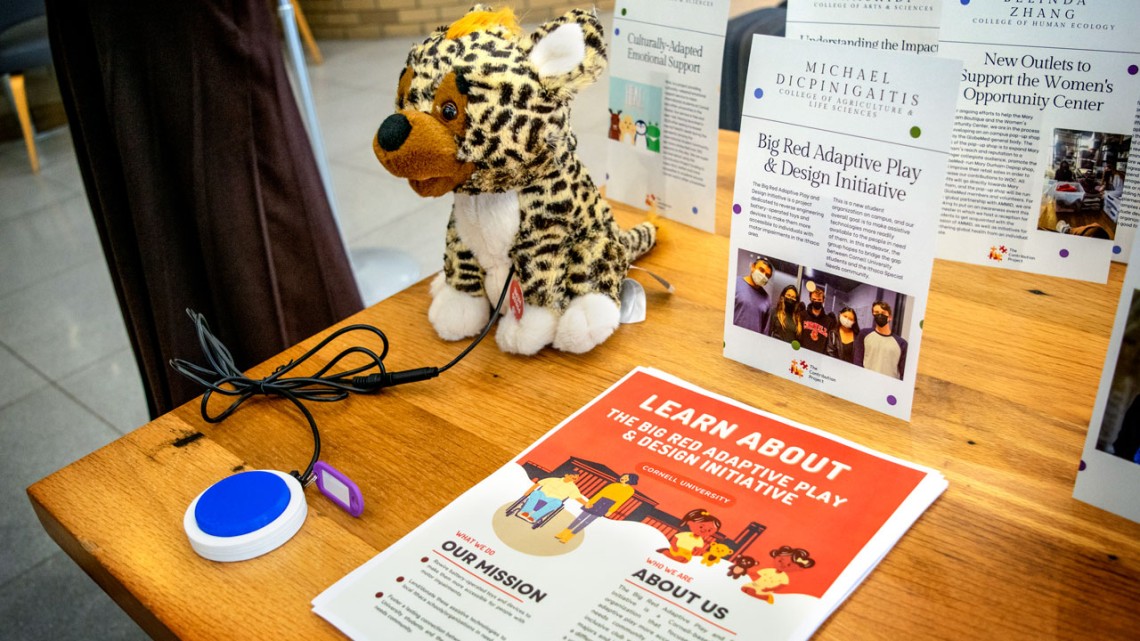
A display table featuring some of the student projects.
With $400, students turn ideas into impact
By Juan Vazquez-Leddon
The Contribution Project’s Student Showcase on May 5 in the Human Ecology Commons recognized the nearly 100 contributions made by Cornell undergraduates who each received $400 to implement their ideas, which ranged from improving medical care in India to making toys more accessible for people with impairments.
“It’s really amazing to see the scope of opportunities that our students want to contribute to,” said Anthony Burrow, leader of the Contribution Project and director of the Bronfenbrenner Center for Translational Research (BCTR), where the project is housed. “They’re noticing needs on campus, in their neighborhood and around the world. The funding could have a small impact, it could be large, but these students are noticing things in their world and how they can be a part of it.”
In February, students were encouraged to apply and explain how they would contribute to the world if they were given $400. The students whose ideas were selected were notified in early March. Students from nearly every Cornell undergraduate college and school had a project selected.
Michael Dicpinigaitis ’24, a biological sciences major in the College of Agriculture and Life Sciences (CALS), focused on accessibility for his contribution, the Big Red Adaptive Play and Design Initiative, which takes battery-operated toys and devices and makes them easier to use for individuals with motor impairments. For instance, the students altered a battery-operated teddy bear with a larger button so children could activate it with their heads instead of their fingers. He said the funding will help the new student organization adapt more toys that are critical for child development for use by children with physical disabilities.
“These toys allow them to learn and play on their own for perhaps the first time in their lives,” Dicpinigaitis said. “They’re also really important for learning more, and also learning how to use buttons, which is an important skill for independent communication with assistive communication devices later in life.”
The event allowed Dicpinigaitis to meet another contributor, Adele Williams ’24, a communication major in CALS, who will use the funds to support the podcast production group State of the Pod. Its eponymous podcast covers emerging issues in science, technology and society, and will soon have Dicpinigaitis as a guest.
“Creating high-quality science information is critical in this day and age with so much misinformation,” Williams said. “As a communication student, I study a lot of fake news. We’re trying to get high-quality science information into the hands of the average listener and make it something you can listen to on your way to work.”
Wynne Williams-Ceci ’24, in the College of Arts & Sciences, used her funds to rent rehearsal space for her all-female a cappella group, After Eight. The group didn’t have the budget to rent proper rehearsal space and was relying on free classroom spaces and an iPhone tuning app in lieu of a piano. The funding was a morale booster for her group but also highlighted an inequality issue, she says, between male and female music performance groups.
“Male music groups on campus receive huge amounts of alumni donations,” Williams-Ceci said. “Every year, all-female groups receive almost nothing due to the simple fact that men in our society earn more than women and everyone wants to give back to the group to which they once belonged.”
Other contributions this year included projects supporting medical work in rural and tribal India, helping high school students prepare college applications, giving the money to people they pass to uplift their mood, engaging older adults in Ithaca and as far away as Hawaii with a meal and conversation, and addressing food insecurity on campus. All the projects that were selected are listed on the Contribution Project website.
The Contribution Project began in 2019, when 50 projects were funded by the Engaged Scholar Prize awarded to Burrow by the David M. Einhorn Center for Community Engagement. This year, nearly 100 projects were funded by HopeLab, a social innovation lab in California that supports research and services that promote youth thriving.
“I love how this project continues to endear me to this campus when you learn what folks are up to outside of the classroom, in addition to everything else they have going on,” said Burrow, who is also the Ferris Family Associate Professor of Life Course Studies in the Department of Psychology. “It gives you a sense of the scope and breadth of what folks wanted to do when we asked, ‘What would you contribute?’ It’s really, really a remarkable glimpse into what it looks like to do the greatest good.”
Juan Vazquez-Leddon is the communications director for the BCTR.
Media Contact
Get Cornell news delivered right to your inbox.
Subscribe
